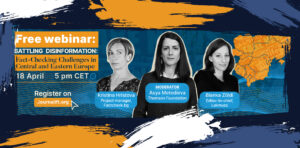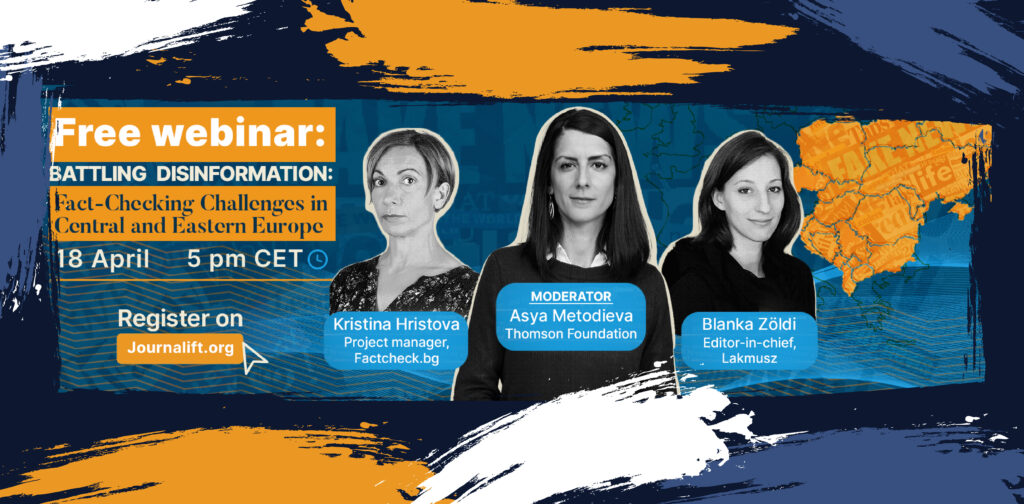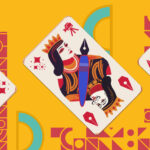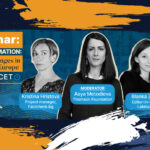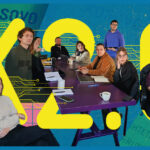Young people in the Western Balkans face hardship understanding their realities and knowing one another due to overwhelming ongoing historical disputes, different perceptions of the recent past, and of social and political issues that make up their lives. Experts in Serbia, Albania, and Montenegro see poor education, prejudices, and the narratives that come from political leaders as main contributing factors in the rise of nationalism among youngsters.
A mural of a convicted war criminal, Ratko Mladic, divided Serbia between those wanting it to be removed from a building wall in the capital and others defending its existence in one of the central Belgrade streets. The clash resulted in protests and strong divisions between those who condemn and those who celebrate the wartime Commander of the Army of Republika Srpska, now one of two administrative entities in Bosnia and Herzegovina.

The recent mural-related events re-opened the question of what kind of history is being taught in different countries of the region and how that affects the perceptions of young people about the current political and social matters. In pursuit of their standpoints and identities, nationalism is being offered as a handout by ruling right-leaning structures in the Western Balkan countries, still sensitive after the ‘90s conflicts. Enabled by obedient media and lack of critical masses, what can be defined as ethnic nationalism had been stirring divisions and raising tensions among different peoples in the region, now sucking in even generations born after the ‘90s.
Programme coordinator at the Belgrade-based Youth Initiative for Human Rights, an organisation gathering young people in Serbia who stand against violation of human rights and promotion of destructive narratives in society, Marko Milosavljevic, explains that there should be a clear distinction between nationalism and patriotism and that this defining line is in justification, commitment, and denial of violence over “the others”.
| Two perspective of Mural Mladic Youth Initiative for Human Rights aims to remove the mural glorifying a convicted war criminal Ratko Mladic on International Day against Fascism and Antisemitism. This gathering is banned. That day, activists Aida Corovic and Jelena Jacimovic were arrested for throwing eggs on the mural. Those days you could see young people in the streets protesting against that action of the police, but on the other side of the police cordon were young people who protected the mural and celebrated Ratko Mladic. This young man took a shift guarding the paint on the wall days and nights for more than two weeks and cleaned it when it was egged and crossed out. Nationalism is an ideology that values belonging to a nation, with a clear distinction from others. According to Milosavljevic, nationalism is the most prevalent ideology among young people due to inadequate education systems; they do not allow space for alternative memory of the wars of the ‘90s and the politics of remembrance that have stifled the anti-fascist tradition of these countries. |
Ivana Vojvodic from Montenegrin NGO Juventas agreed with Milosavljević.
“The education system must recognise the need for critical thinking, civic education, and media literacy. We have programs that should produce a free-thinking person, or we should not promote them at all. These are programs of interest to young people,” she argued.

Miljana Pejic, secretary-general of the National Youth Council of Serbia, said that nationalism is a consequence of strategic divisive political narratives, inadequate media reporting, and the mainstream cultures in these societies.
“It is a consequence of the narrative that exists in the media, which is still sensationalist, one-dimensional, and war-mongering. This way of reporting on regional events contributes to the feeling of insecurity among all citizens, she said, adding that politicians often use such rhetoric. In such conditions, it is easier to hate “others,” especially when they do not have the opportunity to meet them.
According to Akri Cipa, a researcher and foreign policy expert in Tirana, there is no rise of nationalism in Albania, but there is a lack of understanding and knowledge about the realities in neighbouring countries.
“Unfortunately, this is a problematic phenomenon for the entire Balkan region. More youth exchanges are needed to fully grasp the conditions in which their peers have grown up and now live,” he said.
Not Knowing Your Neighbour
The National Youth Council of Serbia publishes an annual Alternative Report about the position and needs of young people in this country. Pejic said that 2021 recorded a decline in the importance of nation and nationality among young people for the first time in four years.
“Every second young person is interested in topics of nationality, such as resolving the question of Kosovo, the situation in the region or foreign policy orientation of Serbia. Every fifth person or 22.7% is interested in dealing with the past and reconciliation, and it records a decline of almost 10% compared to 2020,” she explained.

In relation to Montenegro, she said that religion is one of the most important factors that contribute to the nation/nationality, and in this case, nationalism comes in its most evident form. Regarding Albania, Pejic noted that being isolated for almost 50 years and due to the language barrier, most young people in Serbia consider their peers as completely foreign because they did not have the chance to meet them.
In Montenegro, the issue with the Orthodox church has created a tense situation in the society, thus worsening the relationships between countries in the region; last year's change of government created additional tensions.
| This is not Serbia - E viva Montenegro Cetinje was the centre of so-called “patriotic gatherings” during the last year. There were protests against the current Government and this summer also against the decision to enthrone Metropolitan Joanikije in Cetinje Monastery. The situation culminated on the day of the enthronement when protesters/patriots blocked the road to Cetinje. The protest took place with the support and presence of the Democratic Party of Socialists leader and president of that party and all citizens of Montenegro, Milo Djukanovic. "E viva Montenegro," "This is not Serbia," and "Belvedere" were chanted, and patriots spent the night in the city. Young people from all over Montenegro were there. Cetinje is the capital of Montenegro, a symbol of sovereignty, but also the seat of the SOC metropolitanate in Montenegro. The enthronement of Jonaikije in Cetinje Monastery was described as an occupation of Montenegro, an attempt to repeal the Podgorica Assembly of 1918, and introduction of Montenegro into the so-called Serbian world. |
“We can say that in Montenegro, unfortunately, nationalism reached a peak in the previous year and, in my opinion, for the first time, ‘Montenegrin nationalism’ has been created. We are somehow familiar with Serbian, even Croatian and Albanian nationalism, but so far, we have not had the opportunity to say that there is a Montenegrin nationalist,” said Andrijana Radovic, member of Montenegro Youth Network, which gathers 35 organisations.
“We all came to the situation of thinking ah, Serbs are like this, Croats are like that and so on, until you get into a situation where you meet those people and find out they think in the same way as you and struggle with the same problems,” she said.
Tirana-based communications expert, Edlira Gjoni, explained that many young people in the Western Balkans do not know each other very well – they did not have opportunities for cultural exchange.
“Now whether this is the fact that the youth doesn’t know our neighbours, I would say that it is the core of why there could be signs of nationalism in the behaviour of our youth,” Gjoni said, adding that the youth in the Western Balkans have shared problems, including unemployment and wanting to leave their home countries.
Reflecting on her own experience before becoming a youth activist, Radovic confirmed this as well.
“I am someone who might have been a Montenegrin nationalist. Until I started going to regional seminars, I thought that people from Serbia were aggressors, all Croats were Ustashe, and it all resonated with me somewhere. I don't put all Serbs in the same basket, I had a couple of unpleasant situations in Belgrade where they told me that I don't exist as a nation, and we listen to that every day through certain channels. That is why I understand what is causing anger in a certain part of Montenegro. But not anymore. I went to that one seminar and just met many people from those countries. I became closer to them and realised that we all share the same principles and problems,” admitted this youth activist.
| Nationalist chanting on a basketball game Nationalist chanting does not bypass sports. An example of that is the series of final matches of the regional ABA basketball league in 2019 when Red Star from Belgrade and Buducnost from Podgorica competed for placement in the Euro league. That basketball season in the Balkans was marked by riots in the stands and the basketball court. During one of the guest appearances in BG, chairs and various other objects flew, hooligans chanting, "Kill the Shiptar," and the players were forced to withdraw from the field. The match before that in Podgorica was marked by the son of the then Montenegro Minister of Interior, Mevludin Nuhodzic, Amar Nuhodzic, who walked on the field of the Morača Sports Centrr and spat at the Red Star players. |
One of the conclusions of the study “Shared futures: Youth perceptions on peace in the Balkans,” published by the UNDP and RYCO, was that throughout the region, ethnic-nationalist discourses have the potential to negatively affect neighbouring relations, which are marked by a lack of constructive dialogue and competing narratives about the past, present, and future.

“When nationalism in a certain group is more intense, then you have the answers of other groups in which a certain nationalism may have been aroused somewhere, but the strengthening of one nationalism, especially in the state of Montenegro, inevitably means the strengthening of all others. I think it’s very dangerous for both young people and all of us,” Vojvodic said.
Rigels Xhemollari, executive director of “Qendresa Qytetare” local organisation, which focuses their work on youth and education, said that the most important factor that shapes the relationships and perceptions of young people about the neighbouring countries is the lack of education at schools about each other, even with Albanians knowing little about Kosovo.
“In fact, the Albanian youth, due to poor history textbooks in schools and little mention of neighbouring countries and historical, diplomatic, and political relations, know very little about these countries,” he explained.
Common history, common problems, common nationalism
Akri Cipa thinks that the historical context has a big role in the Western Balkans.
“There are historical contexts and sentiments that have contributed towards that, and this is typical for all Balkan countries nowadays,” he noted.
Historical elements have contributed to people seeing each country with different eyes as well. ith an Albanian majority population, Kosovo, which used to be Serbia’s province and declared independence in 2008, after the war in 1998-1999, has always been an issue seen differently by both countries: Albanians claiming that it is an “Albanian territory” and Serbs claiming the same. Both countries have also been feeding the idea of “Greater Albania,” which means “joining all Albanian lands in one state,” and that of “Greater Serbia,” meaning the same for Serbs. Both those ideas have created tensions and misperceptions among common people, which lead to seeing each other as a threat and danger. And that is a way to increase the ethnic distance between people and nations, which can lead to ethnic conflicts.
| Flag of “Greater Albania” on football match In October 2014 at Partizan Stadium in Belgrade, the national football team of Serbia played against the national team of Albania for qualification to UEFA Euro 2016. The match was abandoned after several incidents. Play was stopped towards the end of the first half when a drone appeared above the pitch, trailing a banner marked with an Albanian flag and a map of "greater Albania" showing nationalist claims on neighbouring states, including Serbia. A Serbian footballer pulled down the flag, which several Albanian players then attempted to take. A confused fight involving numerous players ensued. |
Ivana Vojvodic said that people in Montenegro “definitely have an awakening of nationalism among young people. It is visible, she explained, in the interests of young people...”
“This can be seen in the way young people behave, the type of music they listen to, what is forced on their gatherings, celebrations and even school events, although more and more in the jargon and slang they use, the way they express their messages like through graffiti or in their participation in certain gatherings that have a connotation of national or religious,” warned this activist.
Radovic reminded of some debatable situations in Montenegro:
“We have a situation where Thompson's songs were sung in Cetinje, we also have a celebration in Tuzi when the Kosovo Liberation Army was cheered on. In Ulcinj, most Ulcinj residents will not want to address you in Montenegrin but in Albanian… Displaying other flags in terms of highlighting and emphasising one's other identity is a problem, and it will be an even bigger problem if you allow Albanian, but not the Serbian one... We have certain young people who proudly point out and glorify war criminals. On the other hand, we also had people who cheered for Krsto Zrnov Popović at the gathering in Cetinje, even though they present him as a hero,” says Radović.
When it comes to music, an incident from August 2021 was an interesting showcase of different standpoints and a matter of nationalistic narratives. Serbian musician Goran Bregovic was invited to sing at a local festival in Albania, Korca. The public and social networks were calling for a ban for his performance, arguing that he inspired massacres during the Kosovo war. All artists from Kosovo who were invited withdrew from the festival. A popular football fan group, “Tifozat Kuq e Zi,” (Red and Black Fans) called several times for him to be cancelled by the authorities and said that they would do everything to “cancel it themselves.”
Nevertheless, the concert was held, but it resulted in the arrest of a person who set off tear gas during the event.
Questioning value oration of young people Marko Milosavljevic pointed out.
“That is how Dragoljub Mihajlovic and his successor Ratko Mladic are today’s national heroes. Because authorities send ambiguous messages – declarative, which aim to promote peace and join the EU, and the opposite is evident – the glorification of collaborators and war criminals.”
Based on the studies, interviews with experts and young people, nationalism and not knowing each-other, countries without learned perceptions, are still present in the modern society in the Western Balkans.
The political narrative being pushed by political leaders that includes elements of nationalism, harms the relationships between countries and people. Lack of proper education, lack of travelling, and having working relationships contribute even more to strengthening existing perceptions.
By: Jelena Kontic, Fjoralba Sinoruka, Nikolija Codanovic









